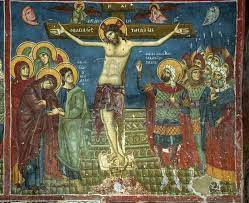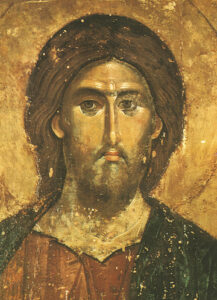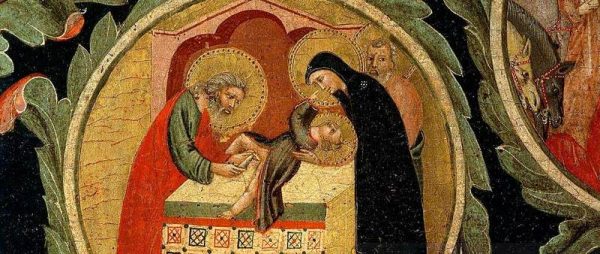from Pravmir
The Circumcision and Naming of Jesus
Most American Orthodox celebrate this Feast on January 1 – or January 7 for any of you on the Old Calendar.
“On the eighth day, when it was time to circumcise the child, He was named Jesus, the name the angel had given him before He was conceived.” Luke 2:21
Did they pronounce His Name as we do? No. The word “Jesus” is an Anglicanization of the Greek word Ἰησοῦς/Yesous, which was a “Greekization” of the Hebrew “Ye-shu” or “Ye-shua”, which means literally “God saves”. It was a fairly common name in First Century Israel – the same as the prophet whom we Anglicanize into “Joshua”.
With that human Name Jesus began His life on earth as a Jewish Man, come to fulfill the Law, and He ascended and carries that Name forever in eternity.
Did you know that the Holy Orthodox Church has a Service of Prayers for the Naming of a Child on the Eighth Day – sadly not often used these days. The prayer begins “O Lord our God, we entreat You and supplicate You, that the light of Your countenance be signed on this, Your servant/handmaid [N.], and that the Cross of Your Only-begotten Son be signed in his/her heart and understanding…” (Just in case you’re worried, circumcision is not part of the Christian rite!) If you have a newborn, ask your priest please to say these lovely prayers for your child. This name should then be used at Holy Baptism, when the child enters the Church and the Kingdom of God.
Jesus of Nazareth
In what follows I in no way intend to downplay the Divinity of Our Lord and God and Savior Jesus Christ. However, today I want to focus on His Humanity, on how compelling and fascinating and attractive the Man Jesus was – and is.
I had been drawn to Jesus since I was a boy, when I read a “ comic book” about His life – and then ever after. But I am embarrassed to tell you that it was not till my first year in Methodist seminary that an old British Methodist professor taught us the Creed, and for the first time I really understood Who Jesus is. Why had nobody ever explained this to me before? Or had I just missed it somehow? No matter, it bowled me over. That first Christmas I believed in His Incarnation, the wonder of it overwhelmed me. How could I have not known Him all these years?
comic book” about His life – and then ever after. But I am embarrassed to tell you that it was not till my first year in Methodist seminary that an old British Methodist professor taught us the Creed, and for the first time I really understood Who Jesus is. Why had nobody ever explained this to me before? Or had I just missed it somehow? No matter, it bowled me over. That first Christmas I believed in His Incarnation, the wonder of it overwhelmed me. How could I have not known Him all these years?
Now, I’m not recommending that anyone imitate my years of blindness. However I think it had one advantage: It allowed me to experience a little of what Christ’s disciples experienced. At first they also saw Him as a Man. I mean, the Apostles did not take one look at Jesus and cry, “Oh, look, there’s God!”
All through His ministry Jesus dropped “hints”, in word and action, of Who He is, but it’s clear they couldn’t take it in. Little wonder. It was inconceivable to Jews that the One God could somehow appear in one Man. (Nor has anyone since begun to understand the Mystery.) Simon Peter eventually even said it, “You are the Christ, the Son of the living God”. But as you read the Gospel accounts, you can see the Apostles doing “double-takes” about Him. “He must be… but he can’t be.” However, as they came to know Jesus the Man, doing what He did, saying what He said about Himself, dying as a Man, then rising bodily still a Man – in the end they came to the only possible, impossible, realization: The Man standing before them was “My Lord and my God!”
But first, it was the Man Jesus of Nazareth. Let’s look at Him as they came to know Him.
Jesus’ Youthfulness
I’ve rarely heard this remarked upon. Jesus was young. In my old age, this strikes me more and more: All that brilliant teaching and wisdom came from the mouth of someone scarcely over thirty years old. Only ten years before, the people of Nazareth had known Him as a teenager! So now when He came home, it’s not surprising that “many who heard Him were amazed. ‘Where did this man get these things?’ they asked. ‘What’s this wisdom that has been given Him? What are these remarkable miracles He is performing?'” Mark 6:2 He must have run into this again and again: “Who is this young upstart?” *
- In a much lesser way it’s like when we discover that many of America’s Founding Fathers were in their thirties or younger. Alexander Hamilton was 21! That explains why in the musical “Hamilton” they have him singing hip-hop music.
Jesus’ Authoritative Teaching
I read that it was not uncommon for a rabbi, when he had finished his formal education, to gather a group of young followers about him and travel from place to place teaching. But this was not a normal situation: Jesus had never been to rabbinical school. When He was teaching in Jerusalem, the elders of the Jews “were amazed and asked, ‘How did this man attain such learning without having studied?'” John 7:15 Imagine the effect on the elders, when “the crowds were amazed at his teaching, because He taught as one who had authority, and not as their teachers of the law.” Matthew 7:28-29
Jesus’ Female Disciples
 Even more shocking was this: Many of His followers were women. The three Synoptic authors all say that at the Crucifixion, “There were also women looking on from afar, among them were Mary Magdalene, Mary the mother of James the younger, and Salome, who, when He was in Galilee, followed Him, and ministered to Him; and also many other women who came up with Him to Jerusalem.” Mark 15:40-41
Even more shocking was this: Many of His followers were women. The three Synoptic authors all say that at the Crucifixion, “There were also women looking on from afar, among them were Mary Magdalene, Mary the mother of James the younger, and Salome, who, when He was in Galilee, followed Him, and ministered to Him; and also many other women who came up with Him to Jerusalem.” Mark 15:40-41
above: from Pravmir
Women in Israel just didn’t do that. Also, apparently most of His male disciples were young, and when women traveled with them… well, people certainly suspected… Consider what would be the reaction of proper folk if young Jesus and His “troop” came to your town.
Jesus the Teacher

Nevertheless, how ordinary people loved to hear him! He drew great crowds – even when people sometimes weren’t sure what He was talking about. For He didn’t lay dry theology and moral teachings on them. He told parables intended to stimulate their minds and imaginations: “The Kingdom of Heaven is like yeast hidden in a lump of dough…”, or like “a mustard seed planted in the ground” – and now you figure out what that means. When He taught directly, often He said things that seemed contrary to common sense. “Blessed are the meek, for they shall inherit the earth.” “ Love your enemies, do good to those who hate you. Bless those who curse you, pray for those who mistreat you. If someone slaps you on one cheek, turn to them the other also. If someone takes your coat, do not withhold your shirt from them. Give to everyone who asks you, and if anyone takes what belongs to you, do not demand it back.” Luke 6:27-30 People must have gone home wondering “What ever did He mean by that?!”
It took me almost fifty years before I began to learn from this young Man: Don’t be “preachy”. Don’t tell people wha to think and do. Rather tell stories about Christ and the saints, then leave people to draw their own conclusions. (Or maybe is this safe to do only in an Orthodox context…?} After all, the Bible a story – from Creation to the End of history. Our theology and philosophy and morality are all enclosed within that story of our salvation. And when God came to save us, He came not as a Book but as a Man with a life story.
Jesus’ forgiveness
One example: the woman taken in adultery was obviously guilty. So what did Jesus do? He embarrassed those who were about to stone her: “Let he who is sinless among you cast the first stone.” Then He said to the woman, “Neither do I condemn you. Now, go and sin no more.” John 8:1-11

Right: Giovanni Domenico Tiepolo But even more shocking was His oft-repeated teaching: “Forgive us our sins as we forgive those who sin against us.” If I fail to forgive, if I try to pay people back, if I hang onto that grudge – then “God, please do the same thing to me.”
Jesus’ love and “humanity”
He did so many good things for so many people – where to begin to list them? Just one story, one of my favorites. After He had raised the young girl from death, and His disciples and her parents are standing there awestruck, He says to them “Get her something to eat.” Luke 8:55 Amidst all this, He saw that she was hungry – and as my wife points out, she needed strength after having been dead!
Jesus’ healings
Again so many stories here, and you know them so well. About 1/4 of His ministry consisted of healing people.
Jesus’ love of children
“Then people brought little children to Jesus for Him to place his hands on them and pray for them. But the disciples rebuked them. [Look, this is a busy, busy man. He doesn’t have time for little kids.] Jesus said, ‘Let the little children come to me, and do not hinder them, for the kingdom of heaven belongs to such as these. And he took them in His arms and blessed them.'” Matthew 19:13-14
Jesus who tears down human divisions
right: by permission of St Isaac’s Skete at skete.com Jews would travel long distances to avoid going through Samaria and deal with, ugh!, despised lower class heretical Samaritans. So where does Jesus take His disciples walking? Through Samaria. Who does He strike up a conversation with? A woman of Samaria. Who does He make the hero for His parable about human-kindness? The Good Samaritan. (The good Democrat, the good Republican, the good liberal, the good conservative – take your pick.)
Jesus’ personal integrity and faithfulness
Even nonbelievers are drawn to His example here: how He gave His life for what He believed in and out of love for His followers, no matter the cost to Himself. “Greater love has no man than this, that he give up his life for his friends.” John 15:13
And then…
Note that, in all the above narratives, I never once mentioned Jesus’ divinity.
But towards the end of the Gospel account, the Apostle Philip who has seen Him, heard Him, known Him for three years and, understanding that He will soon die, asked just one more thing. “Lord, show us the Father and that will be enough for us.” This Father God you’ve been telling us about: we want to see Him. Jesus answered: “Don’t you know me, Philip, even after I have been among you such a long time? Whoever has seen me has seen the Father.” John 14:8-9
This hidden God,“who alone has immortality, dwelling in light which no man can approach; whom no man has seen, or ever can see”, I Timothy 6:16 – do you want to see Him? do you want to know what He is like? Then look at Me…
… and in Jesus see the God who humbles Himself, who loves, who cares not for appearances or “labels”, neither youth nor age nor male nor female, neither rich nor poor, the God who cares not for human divisions. See God who loves little children, who wants to challenge your mind and lead you further into the Mystery of His Kingdom, God who forgives, who heals, who is faithful to the End. And Jesus was about to show them more: that God has power even over death and is “with you to the end of the age.” Matthew 28:20.
So that finally they would understand: “We have seen the light of the knowledge of the glory of God in the face of Jesus Christ.” 2 Corinthians 4:6 “For in Him dwells all the fullness of the Godhead bodily.” Colossians 2:9

with permission of St. Isaac’s Skete: skete.com
If you ever doubt God and His goodness, His love, His faithfulness, His presence with us… look at Jesus. Read the Gospels. (Oh, I wish Orthodox people knew the Scriptures better.) Look deeply into your icon of Jesus Christ. Say the Jesus Prayer. And see God your heavenly Father and His never-failing love for you and for the world in Jesus of Nazareth – our Lord and God and Savior Jesus Christ.
Next Week: A New Year’s Resolution ready to go and only a week late
Week after Next: A saint who lived alone away from the world his whole life, and thereby turned the world upside down – Saint Antony the Great


This is a beautiful post. A God we want – on some level -and need.
Apart from the incarnation, how does one handle the varying testimony of God?
Do we get the Christ who rebukes the Apostles for wanting to call down fire or the God who condemns the stick gatherer?
Do we get the Christ who forgives the adulterer or the one who condemns the dishonest to death through Peter?
Who is God, the one who loves the children and calls them and does not hinder or the one who, in Hebrews, praises the faith of the Judge who sacrifices his daughter to assure victory in his conquest?
Do we get God, lover of enemies, or an Augustine God who chooses His friends?
From what I have read, Orthodoxy claims the God who is love. I so desire this God. But, how does one reconcile the conflicting scripture and history of the faithful? Sin can be tagged for our mistakes, but what for the actions attributed to God that seem to be against Christ revealed – both before the incarnation and after the resurrection?
Thank you, Nick.
I didn’t follow all your examples, but I certainly get your point. It’s the perpetual problem of evil. When things are wrong (for example, when someone I love dies, or when the world is a mess) my first reaction after all these years is still “God, why did you create the world like this? Couldn’t you have made it some better way?” I know that to some people God is just good, and they don’t seem to dig any deeper. Not me. I’m with you, Nick.
The answer is certainly not in people, including Christians and Christian leaders, for we are all sinners. That’s why Christ came to save us. The answer is not in the Scriptures alone, for we can find many inconsistencies there: Joshua seemingly commanded by God to wipe out Jericho, man, woman and child. No, I don’t think so. Nor did Jesus give us an explanation for evil. He said only that wheat and weeds must grow together till the harvest.
The only answer I see is… I once heard a Bishop from India say that were it not for the Incarnation and the Cross of Jesus he would be an unbeliever – he had seen too much horror and evil in his life. The answer is in Jesus Christ who came and suffered evil with us and for us, and then rose triumphant. “Greater love has no man…” That’s not an explanation. It’s a way through the evil, and He leads the way.
That’s all I know. Without that I’d be lost. When evil seems to prevail, whether in the world or in my life, that’s the only place I know to turn. And that also enables me to turn the other way and see what someone called “the problem of good”. There is also so much good in the world, and the Resurrection of Christ tells us that the Good will finally prevail – if not in this age, then in the next.
I don’t know if this helps you, Nick, but it’s what helps me.
God bless you and keep you well.